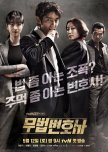
This review may contain spoilers
Recuse the Judge!
“Hypocrisy is the audacity to preach integrity from a den of corruption.” It’s sad that we live in a world where this is far truer than we’d like it to be. Those in power who abuse that power to exploit those around them. Promises of fame, money or even power on some level are often all that is needed to put someone on the path. What is scary about people like Hitler, Stalin, Trump, and many others throughout history, is that they convince themselves that they are doing it for the people and the greater good. When, in fact, it is always for themselves.The Lawless Lawyer sees Bong Sang PIl return to the city of Ki-Song after eighteen years to seek revenge against the kingpin of the local gang and the judge behind him for the murder of his mother, which took place right in front of him when he was ten years old. Now a lawyer, he’s determined to exact his revenge through the law. Bong Sang Pil doesn’t need to find out who is responsible because he was there to see everyone who was involved. But, he also knows that kingpin, Ahn Oh Joo and Judge Cha Moon Sook are too powerful to be taken down any other way. Oh, he could resort to petty violence, but he knows that this would only destroy him in the process. Bong Sang Pil, the nephew of another kingpin, has connections within the underworld, but he’s told by his uncle to stick to the law and not follow his uncle’s path.
Ha Jae Yi is another brilliant attorney whose ability in court is matched by her temper. After punching out a judge for his demeaning and derogatory statements about women, she’s suspended and return to Ki-Song to try and figure out what to do next. Ironically, Ha Jae Yi’s own mother disappeared the same night that Bong Sang Pil’s mother was killed. And we find out that Jae Yi’s mother was instrumental in saving Bong Sang Pil from certain death on that fateful night. We also learn that Jae Yi’s mother has powerful evidence of Ahn Oh Joo and Judge Cha Moon Sook, but she is forced to flee Korea in order to keep her husband and daughter safe.
I’ve seen several K-Dramas where the central theme is political and judicial corruption. “Stranger” was the best I’ve seen. “Chief of Staff” is another. This series is compelling because it deals with corruption within a town and how a corrupt judge rules with an iron fist, using people like tissue, and doing everything for the sake of money and fame. Actress Lee Hye Young gives a superb performance as a woman who simply cannot see that anything she does is wrong or hurtful. To her, people are there to be exploited, and we can’t help wondering how much of an influence her own father was; a man who’s hinted at being a corrupt judge himself.
For the most part, the series moves along at a great pace. What is truly impressive is how the writers are able to weave this tapestry, which is like watching two grandmaster chess players in Bong Sang Pil and Cha Moon Sook, trying to outmaneuver and outsmart each other. While Bong Sang Pil doesn’t have the power that the judge has, we quickly come to see just how smart he really is. And that is what makes his character so compelling. But, he quickly realizes that he can’t underestimate Cha Moon Sook or what she is capable of.
If the series has one major flaw, it’s this: Ha Jae Yi’s mother returns to help. And while it’s been 18 years, there is no way that Ha Jae Yi wouldn’t recognize her. Ha Jae Yi’s father runs a photo studio. The family photo sits prominently in the store window, not to mention the countless photos inside the house. And speaking as someone who lost his father, you never forget a parent’s face. I spent hours, days, and even years with his picture all around me, looking at it whenever I wanted. Ha Jae Yi would be of the same mindset. I understand that the writers did this for the sake of the plot, but it doesn’t work here. They should have come up with another ploy to make it work.
A subplot in Episode 14 also doesn’t quite work in which Ahn Oh Joo tells Bong Sang Pil over the phone that he intends to do something to Ha Jae Yi, and yet Bong Sang Pil doesn’t even bother to warn her or even Chief Tae of the threat. That made no sense either. Again, and I say this often in my reviews when I catch this: do not sacrifice character for the sake of making the plot work! In other words, don’t make a character do something that goes against their nature just to make a plot point work.
All in all, this is a highly entertaining and intriguing series. It’s my second time watching Lee Joon Gi after “Flower of Evil” and I can quickly see why he’s so beloved. The man tackles complex characters and emotions with ease. It’s clear to me that he’s a natural when it comes to acting. Even facial tics and flinches make him even more compelling. It is also my second time with Seo Yea Ji after “It’s Okay to Not Be Okay.” Obviously, her performance in “It’s Okay to Not Be Okay” has far more depth and complexity to it, which she handles like a master artist, but she’s no less compelling in this role. I love how she brings fearlessness to her character. Even when facing Cha Moon Sook, she’s got nerves of steel and won’t back down for a second. I love seeing people, especially Korean women who too often are treated like wallflowers, stand fast and stand strong.
This series has humor, wit, great characters, and a thrilling story. It reminds me a bit of one of the best detective series, “Columbo.” We know how the murder was done, and we even know who did it. What we want to know is how the detective will be able to prove it. In this case, we want to see how Bong Sang Pil will be able to catch Cha Moon Sook, along with everyone else who is responsible for destroying his and Ha Jae Yi’s childhoods.
Was this review helpful to you?
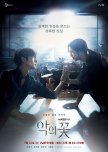
This review may contain spoilers
One of the Best Thrillers Out There!
This is a brilliant Korean thriller that will have you sitting on the edge of your seat—possibly literally! While it has very good writing, it’s the performances—especially from Lee Joon Gi (Do Hyun Soo) and Moon Chae Won (Cha Ji Won) that truly captivates the viewer. I am not sure I’ve seen two performers dig so deeply into their feelings and emotions, and I believe that a big reason for this is their obvious chemistry. If I didn’t know that these two were acting in a show, I’d have sworn that these two truly love each other. That is how believable they are. Now, I have seen other performances that come close, but these two may be the best I’ve ever seen in 45+ years of watching movies and shows. It also depicts the worst parents I have ever seen in all of my years. Man Woo Baek and Mi Ja Gong are unconscionable. I really don’t care if it’s their son. To knowingly help a man kill other people is absolutely no excuse. None. And I had absolutely zero sympathy for such deplorable people who turned out to be as monstrous and sick as their son.Do Hyun Soo is a man living with a horrific past. The son of a serial killer, Do Hyun Soo is diagnosed with Anti-Social Disorder. However, after reading up extensively on Anti-Social Disorder, I will argue that he is misdiagnosed. Given the lack of empathy, prone to violence, and especially substance abuse, Do Hyun Soo doesn’t really fit the bill. I believe that due an obvious lack of love, affection, and the ability to simply interact with others, he’s more like someone who has simply cut off that part of him that is capable of those feelings. That is, until something—or someone—provokes a response. He’s unable to identify various feelings, but that doesn’t mean that he doesn’t have them. It’s clear in his smile, his warmth, and also his love, that he’s more than capable of those feelings. He’s simply like a foreigner who can’t read or identify things. His character is captivating, harrowing, and heartbreaking. And the absolute anguish that he feels when he believes this Ji Won is dead, was raw, powerful, and conveyed everything I knew I would feel as well.
Now, the best thriller I’ve ever seen is “Stranger” which was a show a bit more taut and well-written than this one. It also deftly depicts a man who is incapable of empathy in Hwang Shi-Mok, and that actor gave a very real and stellar performance of such a person. And while Hwang Shi-Mok wasn’t diagnosed with Anti-Social Disorder, he’s much closer to being someone with that disorder than Do Hyun Soo. You really have to take into consideration the amount of abuse and trauma that Do Hyun Soo undergoes in his life to truly grasp what a person might be like coming out the other side of it.
Cha Ji Won may be my favorite female TV character of all-time. I’m not joking either. Now, it may be due to personal bias, because she encapsulates everything that a woman should be—to me, anyway. She’s strong, fiercely loyal, dependable, loving, compassionate, dedicated, and someone who is everything any man would ever want in a companion. I don't know how any sane man would ever let her go. My only issue with Ji Won is in how the writers depicted her as a police officer. Frankly, Doona Bae was far superior because she was smart, competent and held her own with anyone. Here, we find out that:
Ji Won is a terrible driver, allowing a cab driver to knock her car off the road by throwing the meter against her windshield?! Come on! Any seasoned cop would never react that way because they are trained to deal with those kinds of situations. Now, if she’d been forced off the road, that would have been believable.
Ji Won leaves a suspect alone. Now, she actually does get chewed out for that one, but it’s still a very big “rookie” mistake that someone like her isn’t likely to make.
Ji Won can’t remember Do Hae Soo despite meeting and speaking with her not long ago? Police officers are trained to remember faces. That one made no sense.
Ji Won is unable to secure a suspect. Another rookie mistake when she lets Yum Sang Chil escape and nearly kill her. Again, she doesn’t follow standard police protocol.
In episode 15, it made no sense that Ji Won wouldn't answer her phone. She knows her husband is out there and that he might try to contact her. This was another mistake on the writer's part in order to make the plot work.
I’ve said it before: never sacrifice character for the sake of the plot. The only big vice I have with the series is at the end of episode 13 when Ji Won suddenly suspects her husband of killing the housekeeper. Now, I understand that Do Hyun Soo doesn’t help his case by not telling her the truth, but Ji Won has already been through several of these scenarios, and she’s always realized that her husband isn’t capable of murder—until now? Plus, Ji Won never bothers to ask herself—what motive would Do Hyun Soo have to kill the housekeeper? None of it makes sense, and frankly, I felt deeply for Do Hyun Soo when he cries out in disbelief, “How do you not believe me? How do you not trust me?” Now, I know this was done to for the sake of the plot, but it was also a mistake because now you’re sacrificing character for plot. In other words, you’re making the character suddenly do something that goes against their character! For me, this is the only really glaring flaw of the series. “Stranger” and “My Name” had better scripts because they never deviated from or sacrificed character for the plot.
Now, the series is masterful in how it makes you suspect Do Hyun Soo for the first few episodes. You aren’t sure of what to make of him. This was genius! Then, you began to wonder, who is the “other accomplice” in the next set of episodes. And finally, you wonder how they are—not only going to catch the accomplice but do so where Do Hyun Soo is not only exonerated but can finally live a real life.
Outside of “24”’s Jack Bauer, I can’t think of another TV character who’s put through so much suffering and torment. Jack gives his all for his country, and Do Hyun Soo gives everything for his family. And perhaps that is also why I wasn’t entirely enamored with the ending. First of all, using the whole “killer grabs the policeman’s gun” ploy is a plot device that has been overused so many times in so many movies and shows, it should literally be retired and never used again! And I didn’t like the gimmick it used to suddenly rob Do Hyun Soo of his memory. How much more does this guy—and Cha Ji Won too!- -have to endure?! It felt like one step too many. However, the writers did their best to give us “hope” for Do Hyun Soo, that he might ultimately learn how to love his wife and daughter again. Except for Jim and Pam from "The Office" I don't think I ever cheered so hard for an on-screen couple more than these two!
This series is unforgettable. There’s no question that once you start, you can’t stop. It also has unforgettable songs and music—the track “Flower of Evil” is something that I’ve listened to so many times, that it’s literally in my head when I go to sleep. Don’t get me wrong. Despite the few issues that I have with this series, it’s still a great watch! And if I could ever personally meet Lee Joon Gi—and Moon Chae Won especially—I would give them my utmost thanks for giving us one of the best “couple” performances I’ve ever had the pleasure to watch. When they smile, you smile. And when they begin to shed tears, you can’t help shedding a few yourself. That is what true art as an actor is: making us feel what you feel. I will look for these two in future shows to watch!
Was this review helpful to you?
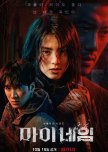
This review may contain spoilers
"Revenge is a Dish Best Served Cold" In One of the Best Mystery-Thrillers Ever Made!
I have been watching movies and show for over 45 years, and I MUST start off this review by stating that Han So-Hee’s performance as Ji Woo Yoon is one of the best I have ever seen from any actor or actress. If she hasn’t literally won every single acting accolade and award, then something is seriously wrong. Yes, her performance is that good, and it’s also a big reason why this series is so good, aside from the stellar writing, directing, cinematography, editing, and pretty much everything else. This is one of the best series I have ever had the privilege to watch.After watching mostly light-hearted K-Dramas over the past four or five years, this series is entirely different. It takes us deep inside the dank and dark underworld of Korean organized crime. A place ruled with an iron fist in Moo Jin Choi (another exceptional performance by Park See Soon). As with exceptional storytelling and one of the best thrillers ever made, we know the players, but we don’t know who is who and what is what. It plays like “24,” “The Departed” and a “Bronx Tale” all rolled into one with a bit of “The Professional” thrown in. The series is, indeed bigger than the sum of any of these parts. It is its own intriguing identity. And the writers do a terrific job keeping us on our toes. Just when you think you have figured something out, and another curveball is thrown our way to make think, “Okay, maybe that’s not it at all!”
Ji Woo Yoon devotes her life to seeking revenge upon the person who killed her father when she was in high school. Throwing herself into hand-to-hand combat training and learning how to use her wits, Ji Woo Yoon becomes what happens when someone is laser-focused on achieving their goal. She doesn’t smile. Her apartment is empty, except for her weight equipment, and her life is basically as empty and dark as the streets she patrols. She doesn’t engage in anything that takes her mind away from her ultimate job: to find and kill the killer. However, things are seldom as they seem, and despite her incredible tenacity—borderline obsession—smarts, and abilities, she’s not invincible or infallible. What is it like to watch someone with that kind of determination? I think of people like Bruce Lee or Kobe Bryant; people who will do whatever it takes to achieve a goal and not apologize for it. This is part of the intrigue of this series and also why Han So-Hee so deftly is able to give us this character and bring Ji Woo Yoon to life. I would be extremely curious about the training she must have had to go through. I have seen some amazing performances by Korean actors and actresses, but this one by Han So-Hee, just blew me away. When I looked at her profile on Mydramalist, I was like, “Wait, is that the same girl?!” A transformation from a beautiful model to a person you wouldn’t want to cross on your best day is something on par with Jodie Foster, Doona Bae, Helen Mirren, Cate Blanchett or Meryl Streep. Yes, I’m putting this performance of Han So-Hee on that kind of a level. I think it takes tremendous courage and dedication to turn in this kind of performance.
At only eight episodes, this series will make you feel like you’ve sat through sixteen or even twenty. You can’t help but watch the next episode after you’ve finished one, and by the time it’s all over, you might feel like you need a vacation or, at the very least, a few days to catch your breath.
I love movies that showcase strong female characters, and this one certainly achieves that. We need more characters like this one. Ji Woo Yoon is definitely not someone you’ve ever seen in most K-Dramas, and man, am I thrilled to death that they pulled no punches in this hardcore series. The violence is extreme, but there is no scene that doesn’t belong, no act that is out of place. It plays like a meticulous hard rock song that always pulls you in. I’m so glad that Netflix collaborated to bring this series to light as well as keep every element of the story intact. As far as mystery-thrillers go, you’ll be as hard-pressed as I am to find one that’s better. I can only think of two off the top of my head: The movies “Seven” and “Silence of the Lambs.” And, yes, “My Name” belongs in that company.
Was this review helpful to you?
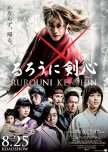
This review may contain spoilers
Killing Gives Birth to Hatred, and Hatred Kills In Its Turn
Himura Kenshin is a samurai and former assassin who has killed countless times. He soon discovers that each time he kills, it costs him a piece of himself.Vowing to live by a new code. A code in which he refuses to kill, Kenshin becomes a very unorthodox and yet inspiring character who uses his incredible fighting skills to help those who can't fight or defend themselves.
The Wanderer finds himself coming across young Miss Kaoru who owns a fencing dojo. Her dojo is wanted the new town bureaucrat who finds that in the new Japan, money is power. Not the samurai. He buys what he wants, and sends his own paid thugs and assassins to deal with those who refuse to sell.
Kenshin finds his new vow tested to its limits. For someone who has killed countless times, what's one more? And what does it matter if it's done to protect or save someone?
The fighting choreography is probably the best I've ever seen. The speed and skillset of each move is so lightning-quick that if you blink, you'll miss a sequence.
And yet this movie is so much deeper than a mere "samurai/martial arts" film. It's about love. It's about redemption. And it's about realizing that it's never too late to change. "No one is not worthy" Kenshin reminds one of his opponents. He's not only speaking about his foe, but also reminding himself that he's not lost.
The best pearl of wisdom is spoken to the high police official who believes that Kenshin is insane for applying a code that--in his mind--is ludicrous and can't possibly work. Kenshin replies, "Killing gives birth to hatred, and hatred kills in its turn. To break that chain, I carry a sword that will not kill." Indeed, Kenshin carries a blade that is backwards to help him prevent killing.
This series is simply a work of art. It has mystical elements, bordering on the "superhero" genre, but at its core, it's about the power of justice. There are elements of humor as well as a lot of flamboyance, but I believe that this is intentional, as I'm guessing that manga series it hails from is much the same.
I watched "The Beginning" and "The Final" before Netflix finally gave us the other three films. So far, none of these films have disappointed me at all. Two hours and twenty minutes seem to fly by.
Was this review helpful to you?
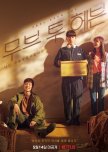
This review may contain spoilers
Like a Yellow Box, All of the Important and Beautiful Elements Can Be Found in this Series!
"Move to Heaven" is a little gem of a series that is fulfilling and uplifting in its short 10-episode story arc. The show is like a yellow box that has all of the important things in it, leaving nothing out, and putting no extraneous or unnecessary plot devices into it.The story is about trauma cleaners. Don't know what trauma cleaners are? Neither did I until I watched the show. Trauma cleaners are hired to go into a deceased's dwelling and clean it. Sometimes, it is not very glamorous, especially if the body of the deceased has been there for an extended period of time. But the key element of the job is to collect those important and necessary items that the deceased has left behind and give them to a relative or someone who was important to the person who died.
Han Geu-ru--who is masterfully portrayed by Tang Joon-Sang and should win every actor award that he's nominated for--is a 20-year-old boy with Asperger's Syndrome who is gifted with unique and special insight. Not only is he able to remember anything with a momentary glance, he is able to piece things together in order to learn more about the person who died. Of course, Geu-ru's world is strictly ordered, and any deviation from that order brings him into hysterics.
After his father suddenly dies from a heart condition, Geu-ru is put into trial custody under his uncle, Cho Sang-Gu, a man who's just gotten out of prison and is an ex-MMA fighter. Cho Sang-Gu is rough around the edges, to say the least, and the last thing he is initially interested in, is taking care of a nephew he doesn't give a hoot about from a brother he hated and despised. Part of the beauty of the story is in how these two grow closer together.
Move to Heaven reminds me a little bit of "Highway to Heaven." It seems like the kind of show Michael Landon would have done. The show runs much deeper than two men packing up items. In each episode, we learn how the deceased lived. There are some truly though-provoking stories of people--who may seem unremarkable--but end up being remarkable in their own, unique ways, that in real life, might not garner much attention. But we quickly learn the invaluable truth" Every life is precious. And every life has a story to tell.
Don't be surprised if a number of episodes has you reaching for a tissue or a hanky. There are many beautiful moments that will have you doing just that!
The story implores people to think about how they treat others. To think about what is really important. We see our share of greedy, selfish, and vindictive people who clearly don't give a hoot about their fellow man. Even when that fellow man is a relative. The story begs us to prioritize and remember, not only WHAT is really important in life, but WHO!
I was more than happy to see that the writers seemed to leave the door open for a second season. Ten episodes went by a little too quickly for me. But it's also a series that I loved so much that it invites repeated viewings.
In short, the world desperately needs more shows like this one!
Was this review helpful to you?
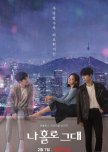
This review may contain spoilers
"Ships Are Safe in the Harbor, But That Is Not What Ships Are For!"
This is a fascinating character-driven series that I feel that many people will be able to relate to. So many people have suffered unimaginable suffering that they choose a life of solitude in order to prevent something like that from ever happening again. In short, the "defense mechanism" kicks in and the walls go up.We have two such characters in Nan-Do Ko, and So-yeon Han. Nan-Do is so traumatized by his mother's suicide, that he prefers a world of computers. He locks himself away, immersing himself in his latest project: an AI.
So-yeon is also traumatized, but for another reason in which her memory blocks out the event and also causes her to have facial-blindness, also known as prosopagnosia. In short, she is incapable of recognizing someone by their face. To her co-workers, she comes off as cold and rude because of this.
Little do we know that Nan-Do's invention brings a light to So-yeon, who is pretty much a social outcast. She spends her free time up on the roof of her apartment building, drowning herself in alcohol...her only means of coping with an essentially empty life.
We also find that there is much more to the story than meets the eye, as a tragic event is responsible for Nan-Do and So-yeon's current states of self-loathing.
So then, how are two anti-social people able to come together? You can only imagine the bumps and pitfalls of two people ineptly attempting to navigate the social awkwardness that exists between them, despite their obvious feelings for each other. Uniting them is Holo (Nan-Do's AI) who is only able to express himself honestly as well as unconditionally. In short, he is what many humans aspire to be--not only for themselves--but also for each other. Holo is the ideal version of the best version of a person, no matter how unrealistic he may be.
Love is the simplest thing in the universe, and yet our egoic minds make it the most complex thing in the universe. It requires us to take a chance. It requires us to have trust and faith. And it requires the ultimate form of courage: to be absolutely vulnerable.
Would people love to have their own "Holo?" Of course! But that is not a relationship. It's a fabrication for those who wish to play it safe; for those who do not want to risk being hurt; for those who wish to remain safely entrenched within their walls; for those who prefer to remain in the harbor. It's funny and sad how much our technology today has crippled people's ability to communicate genuinely face-to-face.
"My Holo Love" is only twelve episodes long, but they are rock-solid episodes! I was grateful that the writers didn't attempt to stretch things out.
Performances are fantastic across the board. Especially from Hyun-Min Yoon, who must be given the highest accolades for being able to deftly play two distinct characters. That is not nearly as easy as many people might believe.
My only issue was that the "stage" was almost too small. Such a technological breakthough would not only bring notice from a rival company as well as local law enforcement, but would easily bring the scale to nationwide attention. The National Intelligence Service as well as the government would undoubtedly be involved as well. Still, this is a minor point as the story is well written.
I was also pleased that we didn't get the typical, cliched storylines involving the romantic aspects of Nan-Do and So-yeon that tend to flood most Korean romantic dramas. It not only felt fresh but also much more realistic. I'm glad that there are writers who are still able to think outside the box in this regard.
If you want to immerse yourself in a wonderful series, you really can't miss with this one!
Was this review helpful to you?

This review may contain spoilers
Rock Solid Romantic Comedy With an UpLifting Message!
This is my first foray into Filipino cinema, and I wasn't disappointed. A great story and wonderful chemistry between Kathryn Bernardo and Daniel Padilla make this a wonderful film. Little did I know that these two have collaborated on several movies and are an "item" in real life. Makes sense.Jackie is an angry young woman who doesn't like her life or anyone in it. Her dream is to go to New York to study photography in order to leave home. However, she is unable to stay out of trouble and ends up in jail. Her mother pleads with her father to let her come to a small, rural village to do some volunteer work for a week. Her father relents, against his better judgment.
Kiko is a responsible young man, who finds himself caring for his younger siblings while his irresponsible mother is out galavanting with any man she can find. He is also one of the coordinators for the program that provides help to the village.
Jackie sees only what has been done to her. In short, she plays the victim. One can understand her anger and resentment once her mother confesses what happened to her when she was young, but Jackie has trapped herself in a miserable situation. Playing a victim will always do that. Kiko, however, who has a number of challenges of his own, elects to fight through them. He doesn't play the victim, which demonstrates why he's a much stronger and more mature person.
Of course, Jackie is resistant to the volunteer program, and even devises plans to escape. Once locked in, she finds herself in a village without electricity, so she can't be on her phone 24/7 as she likes.
I'm a former Peace Corps volunteer, and there is nothing quite like having all of your luxuries and comforts stripped away, which forces you to deal with whatever is in front of you. Jackie learns this lesson as well. She learns quickly that there are people out there with much tougher situations than she's got. In short, she finally begins to mature and grow up. In short, service to others can induce a powerful healing, which is exactly what Jackie needs.
The film is truly beautiful in how the volunteers work with the villagers. So much of it reminded me of my own service. However, the film doesn't end there. As one easily surmises, it becomes evident that Kiko and Jackie have developed feelings for each other.
It is here that I wish the film hadn't decided to use a cliched scenario to set up the "big ending." Too many films do that. I thought that the confrontation between Kiko and Jackie, when he didn't show up for the wedding, would have been perfect, followed by family resolutions after that. I would have been much more practical and unique. However, I can't complain as the movie still works very well. Still, my heart (and my favorite part of the movie) is when they are together at the village.
And I also have to love one of my favorite songs from my high school days, Starship's "Nothing's Gonna Stop Us Now" and how it's used so brilliantly. I'm looking forward to watching more films like this one!
Was this review helpful to you?

This review may contain spoilers
Dare to Fulfill Your Dreams!
There is only one person who stands in the way of fulfilling your dreams: you. Anyone who tries to be an obstacle to your dreams is probably not someone you'd want to be in a relationship with. The person you do want to be in a relationship with is someone who believes in you; not only will they not stand in your way, they'll encourage and empower you to do whatever it takes to make your dreams come true.Ethan is a young, hot-shot producer of shows. He's eagerly awaiting a promotion to production manager, that he feels that he's entitled to and has earned. However, to his disappointment, the job is given to someone else. He's told that the one area he's not very good with, is working with people. He's sent to Bacolod, a small town where he's told that if he can produce a successful show, then he will get the production manager job.
Audrey is a warm, caring young woman who dreams of making shows. She uses her small video camera to record everything for her boyfriend, Tristan, who has been comatose from an accident for over 150 days.
We learn that before the accident Audrey had a chance to go to Manila to learn about making shows. Tristan, of course, objected. In fact, we quickly find out that Tristan is a very controlling boyfriend who spends much of his time telling Audrey, "what to do" and "what not to do." However, it is clear that Audrey loves him...until she sees love for what it truly is!
Love is never about control. It is never about possession. It is about giving the other person the freedom and the space to be who they are. Ethan shows Audrey this type of love. Audrey, of course, is torn between her newfound love for Ethan and being true to Tristan.
Now, one might think that things become a bit cliched at this point, but that doesn't really happen. What makes this story work so well is that Ethan demonstrates and unconditional and selfless character who will simply do the mature thing; the right thing. They say that love conquers all. Well, Ethan is certainly an example of this.
There are a number of touching moments throughout the film, and I love the fact that Tristan is shown as being a "bad" guy. He's not. Despite his ignorance, it's hard not to sympathize with him.
The performances are all first-rate, and you end up feeling good about having watched this film. While many people believe that love is about being true to your partner, it's even more important to be true to yourself. And never let anyone or anything stand in the way of your dreams!
Was this review helpful to you?
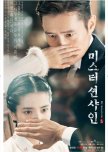
One of the Best Shows I Have Ever Seen!
I have been watching movies and shows for over forty years. And, yes, this show is THAT good! After watching "Descendants of the Sun" only a couple of years ago, I was wondering how long it would be before another grand series came about; a series that resonates with the heart and soul; a series with a crisp story and fantastic performances by the actors. And along came "Mr. Sunshine."I can only think of a couple of series that are on par with "Mr. Sunshine." "Band of Brothers" is one and "Descendants of the Sun" is another.
What is truly sad is that much of the world is quite ignorant when it comes to Korean history, I'm sure. It's a country that always seems to be at odds with Japan, and sometimes China and Russia as well. Its turbulent history has too often been plagued by invasions or other countries attempting to gain control of the small peninsula.
"Mr. Sunshine" tells of the time when Korea was, once again, fighting against Japanese occupation in the beginning of the 20th century. With virtually no real army to speak of and a king with little power on the throne, Korea or "Joseon" found itself relying on rebel guerilla tactics to try and prevent the Japanese from a complete takeover.
Several characters find themselves unknowingly intertwined with each other at the outset of the series. One boy finds himself quickly orphaned and making his way to America to begin a new life. He returns to Joseon years later as a U.S. Marine Captain. Little does he know how the turn of events would pull him into the conflict between his previous homeland and Japan.
The story's focal point is on three men who all happen to have feelings for the same woman, Go Ae-shin; a woman with a background as terrible and wrought with horror as the marine captain's. And yet, she is the heart and soul of the rebel forces. It is admirable and captivating to see this woman spearhead the rebellion, as well as her willingness to do whatever it takes to help her country. Tae-Ri Kim is perfectly cast, giving Ae-shin tremendous depth and complexity to her character.
The cast is simply magnificent from top to bottom. Every role, no matter how large or small, is handled with immaculate precision and depth. However, there is, to my mind, one who stands out just a hair above the rest. And that is Byung-Hun Lee as Eugene Choi, the marine captain. The man has a regal distinction that very few actors in history have been able to pull off with such ease. He may appear to be emotionless in many of his scenes, but to make such an assumption would be wholly inaccurate. I've said many times: an actor/actress who can say more with their eyes than with words, is a true master at their craft. Byung-Hun Lee is such a performer. I cannot imagine anyone else playing this part with the integrity and depth that he brings to Eugene Choi.
This is quite literally a "Do not miss!" series. With 24 episodes, each at about 75 minutes each, you are in for a wonderful treat. This is a show to savor. One might be wishing to quickly move on to the next episode, but I found myself stepping back and letting each episode soak within me instead. Like a perfect French dessert, you relish taking your time and savoring each bite. This is such a series.
Was this review helpful to you?
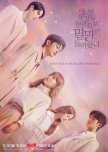
This review may contain spoilers
A Truly Loving And Unique Romantic Series About Life Itself!
What is the difference between creation and destruction? Is there a difference? Can one exist without the other, or they merely two sides of the same coin. For creation to occur, there must be destruction, at some point, and the same can be said of destruction. A star is born from material from a supernova, which is the death of a star, which provides the basic building blocks for creating new stars.In The Lion King, we get a similar explanation for the Circle of Life. Lions eat the zebras, but when lions die, it creates the necessary components for zebras to be able to live.
It has been said that “God” is the Alpha and the Omega, as well as being neither the Alpha nor the Omega. In the Hindu religion, you have Vishnu (God) who creates Brahma, which is the creative force and Shiva as the destroyer. In short, what this is about is Life itself. And this is what this series is about.
Tak Dong Kyung is a young book editor who finds out that she has an inoperable brain tumor and that she only has a few months to live. A young woman with her whole life ahead of her, in her anger and despair, wishes for doom to fall upon the world. What she doesn’t anticipate is Doom responding. And much to her surprise, she finds herself the object of Doom’s interest. He is the destroyer, the entity who makes things disappear, as he puts it in order to maintain the balance of Life. However, Doom’s response plays an integral part in his story as his fate as well as Tak Dong Kyung’s are now tied together.
Doom promises Tak Dong Kyung that the remaining 100 days of living will be painless so long as she wears a small, red, string bracelet. The more time that Doom spends with Tak Dong Kyung, the more he becomes enamored with her, and she with him. As an entity, he has no need to eat or sleep, and he is also able to hear the thoughts of people around him. He also professes that he is incapable of love, although we begin to doubt this claim as the story progresses.
Meanwhile, a lone, young girl occupies a small hospital room, and she appears to be ill. However, we soon learn that she is the one who created Doom in the first place, and she has a mysterious pot with fertilizer but no plant. She waits patiently to see if it will bloom for her Garden. The girl represents “Life” or “Vishnu” or “God.” She represents the Observer and the Observed. Her sole desire is for the happiness of humans and nobody—not even Doom—is beneath or notice or her love. She recognizes and even acknowledges that Doom is a necessary component of Life, but even Doom is given the greatest gift: freedom of choice. He can choose to remain as Doom or “fall” and eventually become human.
Meanwhile, Tak Dong Kyung, who appears to be a strong woman, finds herself facing her own mortality, and it is with Doom’s help—despite him being a force of destruction—still possesses wisdom. As with many people upon finding out that she has a terminal disease, Tak Dong Kyung runs away, and vows never to love anyone. Even Doom knows that this is a supreme act of cowardice and that a person who cannot love, is essentially dead already. This forces Tak Dong Kyung to finally cry out, “I want to live! I want to live and love everyone!” which is an incredibly touching and powerful scene.
Equally powerful is the moment where Doom and Tak Dong Kyung must make a choice: either she dies and secures his place as Doom, or she lives, and thus makes Doom inconsequential or non-existent. Doom sweetly takes the burden from her, as he states, “I am here to save you and to ensure that you live.” And in an act of supreme, unconditional love, Tak Dong Kyung is spared the awful prognosis that had awaited her. But, at what cost? Before he disappears, Doom implores her to live and be happy no matter what, and she does her absolute best to do this.
Having faced her own mortality, Tak Dong Kyung has acquired some Life wisdom of her own, telling her indecisive friend, Na Ji Na, that she doesn’t need more time, she needs courage because you never know how much time you have left. And perhaps, for the very first time, she is able to open up and profess her love for Doom as well as for her family. It’s ironic how many people in this world are literally afraid to love, and yet, it is the only way in which true happiness can be experienced.
Aside from being an incredible love story, this series is a deeply moving and engrossing spiritual journey as well. “God,” “Doom,” and “Tak Dong Kyung” make up the trinity that exists. We find that “God” is not fearful or vengeful, nor is She a dictator requiring unswerving loyalty and obedience. She is the Loving Mother who only desires the best for all humans everywhere. And her love is no less even for those aspects—like Doom—who are simply there to be a vital process of Life itself. She tends a Garden of a sea of flowers, which is a representation of all humans. She is sweet and loving, but also non-interfering, knowing that each person must walk his/her own path. Such is the power of the freedom of choice.
Bo-Young Park is one of my all-time favorite Korean actresses. She was among the first I experienced when I began my foray into K-Dramas, and she’s never disappointed. First with “Oh, My Ghost!” and then “Strong Woman Do Bong Soon.” She’s fearless in her display and expression of emotions. What she feels, we feel. She can also be cute and sassy.
While the rest of the cast is superb, Seo In Guk (Doom) and Jung Ji So (“God) are equally dynamic in their respective roles that truly make this series work.
This isn’t just a feast for romantics, but a magical journey that just might give you food for pause regarding your own beliefs regarding Life and death. Life has no opposite. The opposite of Death is Birth. Life is endless.
In truth, I’ve never seen a series like this one, and it certainly did not disappoint. The writing, directing, and acting were all first-rate. It is a truly touching, poignant, and moving experience to watch this series. And perhaps, the series begs the viewer to ask the question: are you living Life? Or are you simply caught up in the current of Life? Yes, there is a difference.
Was this review helpful to you?
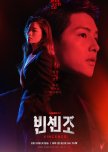
This review may contain spoilers
Impeccable Series--Nearly Ruined by Writer Park Jae Bum!
I’m not sure how many times I have to repeat myself. I’m a writer of eight novels, and one of the most basic elements of writing is that you never sacrifice character for the sake of the plot. In other words, you don’t make a character do something that goes against the character in order to make the plot work. And writer Park Jae Bum makes a very rookie mistake in Episode 19 that carries over into Episode 20.For the most part, Vincenzo is an impeccable series that is nearly flawless until those terrible 20-25 minutes—the end of Episode 19 and into Episode 20. We are extremely fortunate that this doesn’t ruin the series. As I said in the series “Mad For Each Other,” if you ruin the ending of a series, you destroy the series itself.
Vincenzo is a character on par with Jason Bourne or dare I say it—Batman (the comic character, not the live-action depictions) in which he’s like a grandmaster chess player. He’s always two or three moves ahead of his enemies. He’s also a master of assessing a situation and making the smart choice, not to mention his nearly infallible ability to predict what will happen next based on his enemies’ last move.
Choi Myung Hee has just arranged for herself to take the fall for Jang Han Seok. Despite the fact that we know why she’s doing it, it should be equally obvious to a character like Vincenzo. And yet, neither he nor Hong Cha Young can see the obvious: that it’s to get Jang Han Seok out of prison. That was rookie mistake #1 by Park Jae Bum
Jang Han Seok has abducted Hong Cha Young and Vincenzo is purposely brought to Jang Han Seok’s house in order to kill him. During the ensuing struggle as Jang Han Seok’s brother—Jang Han Seo—jumps him. Rather than helping Jang Han Seo subdue Jang Han Seok—who has a gun—Vincenzo rushes to free Hong Cha Young instead. Vincenzo would never do that. He would realize that the best way to keep Hong Cha Young’s safety—as well as Jang Han Seo—is to help Jang Han Seo take out Jang Han Seok. Now, if in the ensuing struggle, Jang Han Seok manages to escape, that’s all right. But I sighed with disgust when Vincenzo rushes over to Hong Cha Young instead. He would know that the best way to protect her would be to disable and take out Jang Han Seok. That was awful. And again, it’s something Vincenzo would never do. It goes against the intelligence and nature of the character himself.
Things briefly go from bad to worse as Vincenzo, who is now tending to the wounded Hong Cha Young, is literally watching the two brothers struggle with the gun—and only a few feet away—he still doesn’t rush to help Jang Han Seo. He sits and watches. Again, I was rolling my eyes with disgust at how ridiculous the entire scenario played out. It was obvious that they wanted Jang Han Seok to escape to set up the showdown for the rest of Episode 20.
As I said, the series was running smoothly, for the most part. Aside from some inconsistencies from the residents of the plaza and their fighting abilities as they go from an inability to fight to suddenly being experts, even though the so-called boxing winner can’t even throw a punch mirroring an actual boxer (a true boxer would know how!) the series runs like a fine oiled machine.
One more small issue--which most movies and shows take extreme liberties--is moving the gold bars. We see the bars being put into a piano, taken around in pockets and bags, sometimes 3-4 bars at a time. Gold bars weigh over 27 pounds each! (12.4 kilograms). While it made for some funny moments, it was highly unrealistic.
It's difficult to pen down the actual genre of this series, which often plays out like a black comedy and then transitions into a drama-thriller and then back again. I’ve marveled at the Koreans’ ability to fluctuate and do it seamlessly. It speaks to the genius of their writers, despite Park Jae Bum’s lapse in judgment and writing ability.
Vincenzo is a Korean-Italian consigliere—essentially one of the highest ranks in the mafia aside from the head man himself. He makes no apologies for his methods of dealing with those who would prey upon the weak and the helpless, and he brings his own sense of “justice” to bear against anyone—from lowly thugs to those sitting in power, bathed in corruption. Little do these people in power know who or what they are up against, nor do they realize what Vincenzo is capable of until it’s too late. It’s like watching very good chess players who think they can hold their own—finally meeting their match against a grandmaster. Vincenzo easily exposes their inabilities, and they find out soon enough that Vincenzo isn’t someone who makes idle threats. He means to do exactly what he says he’ll do. Jang Han Seok and his nasty den of lieutenants look at Vincenzo and laugh as though he’s just some character in a movie. But he outplays them and outdoes them at every turn.
“24”’s Jack Bauer—a special field agent for the Counter-terrorist unit once tells a panel of senators, “It’s sad that we live in a world where someone like me is necessary to do what needs to be done.” Vincenzo is of the same ilk. The higher-ups in corporations and political machinations believe they are all but untouchable and that they can do whatever they want. Someone like Vincenzo is able to prove to them just how wrong they are. But it also takes someone like Vincenzo to deal with them in complete and unforgiving ways.
I have always marveled at characters who are smart. I love Jason Bourne because of his ability to outthink his opponents. Batman is the same. And Vincenzo has those same qualities. Oh, he can fight and hold his own, but it’s his wits that make him formidable and such an iconic character. Song Joong Ki masterfully plays Vincenzo—who at times—seems light and almost playful, and other times as an absolutely scary opponent you would never dare cross if you understood him and what he’s capable of doing. He doesn’t play Vincenzo as a simple thug. And despite his background, Vincenzo becomes attached to the people of the plaza and will do whatever it takes to protect them. He calls himself a “villain” and yes, he often comes across that way, but he’s essentially a good man who simply finds himself using terrible methods to get the job done. Much like Jack Bauer, as I stated above.
The entire cast was nothing short of fantastic, and if it had not been for the major letdown of those 20-25 minutes, this series would have easily been a “10” for me. But, alas, those minutes put a big dent into a story that was running along so smoothly and so effortlessly. It’s just too bad that the ball was dropped temporarily. Still, it doesn’t torpedo the series, and it’s definitely worth a look. It’s not as great or as tautly written as “My Name” or “Stranger” but it’s most certainly good enough.
Was this review helpful to you?

This review may contain spoilers
South Korea is the New Hollywood!
All Hollywood can do anymore is give us CGI-fest films with no depth in character or story, or remakes that are almost all worse than their originals. Typically, the films tend to mirror the demands of their audience; people who can barely sit through anything that actually requires some attention.Korea gives us a great space story that is a bit of a mixture of Wall-E, Firefly, and Blade Runner. The film also gives us a great balance of story, character, and action. Why does the story work so well? Because like all great storytellers, they focus on the story and the characters.
George Lucas once stated, "a film with special effects and no story is a pretty boring thing." Funny how he would actually end up going against his own proverb, and it is also true of what has happened with much of western filmmaking, as stated above.
The film also has a lot of heart, which will make the viewer all the more appreciative that it isn't just an action movie. This is enhanced by veteran actors like Joong-Ki Song (Descendants of the Sun) and Tae-Ri Kim (Mr. Sunshine) as well as Jin Seon-Kyu.
The movie isn't perfect, but if you want a good story, some laughs, and some great action sequences, you won't be disappointed.
Was this review helpful to you?
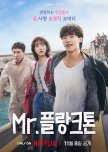
This review may contain spoilers
Living a Life!
It’s been said to live each day as if it were your last. What would you do if you found out that you only had a limited amount of time left? The irony behind that question is that EVERYONE has a limited amount of time left to live. The most important question is how are you living? Most people in this world use a life to live rather than living a life.Hae Jo is a young man who finds out that he’s terminally ill. His life has been full of suffering and dealing with abandonment. He’s constantly pushing away anyone who gets close to him because he feels he’s unworthy of being loved. He lives a life doing odd-jobs which often get him into trouble. He doesn’t care. After all, what’s the point? The only jobs he doesn’t take are missing persons or killing someone. Anything else is fair game. The irony behind not taking missing persons cases is that he, himself, is a missing person. Hae Jo is a young man who lives recklessly, not caring what he does or who he hurts.
But then, of course, as soon as he finds out that he has maybe three months left to live, he sets out to find his father who turned his back on him as soon as he found out that he wasn’t Hae Jo’s biological father. I’m still reminded of the classic line from “Boyz N’ the Hood” that any fool can make a baby but only a real person can be a parent. Hae Jo’s mother committed suicide, and his father ignored him. Hae Jo decides to take along the only person he’s ever loved and who has ever loved him: his ex-girlfriend, Jo Jae Mi, who is, herself, an orphan. These are two lonely souls who can only seem to find love, peace, and solace in each other. But Hae Jo is still too afraid of being cast aside yet again.
Jo Jae Mi is young woman who is trying to find some kind of love and companionship. She’s set to marry Eo Heung, the son of a wealthy woman. However, as soon as Jo Jae Mi finds out that she has pre-menopause, she realizes that her potential marriage is doomed. The other factor here is that, even though she cares deeply for Eo Heung, her true love is Hae Jo, who hysterically shows up at her wedding and kidnaps her! Make no mistake, this is a black comedy with some serious drama thrown in. The Koreans are masters at utilizing multiple genres within a single series.
Jae Mi, who is a reluctant passenger at first, finally agrees to help Hae Jo find his biological father, which turns out to a funny road trip around Korea with these two going through one adventure, or even misadventure, at a time! They fight, they quarrel, they love, and yet every time Hae Jo tries to push Jae Mi away or abandon her, she keeps coming back. Throughout most of the series, Jae Mi has no idea that Hae Jo is dying, and it’s tough to watch her reaction as soon as does.
Hae Jo is a man who uses his last three months to the fullest. He learns how to live without caring what may or may not happen. The title of this series is “Mr. Plankton.” Plankton may be considered the lowest among the food chain but its vital part in providing life to so many sea creatures cannot be ignored. Hae Jo is like plankton. Not only does he learn to live his own life, but he helps others do the same. What is true incredible, is that he doesn’t realize the level of his importance or how much he means to others, despite the fact that his own family deserted him. His family now consists of Jae Mi, Eo Heung, Bong Suk, and his partner Yoo Gi Ho.
Jae Mi is Hae Jo’s rock. She’s unwilling to let him push her away. Now, that’s a true companion! Someone who is willing to be there for you through thick and thin. It’s incredibly sweet when she confesses to Hae Jo that he’s always been her true love, and he confesses the same. While it may not be conventional, this is true, unconditional love at work. Neither one cares how the other lives their life or what faults or issues the other has. This type of love has a way of permeating everyone else around them as Eo Heung and his mother finally understand what it means to love. True love is never about holding on, but about letting go.
At only ten episodes, it feels like sixteen. That’s not a bad thing. The writers were brave enough to stick to the character and story. No sudden miracles were to be found here, unless you count the miracle of two “lost” souls finding love in themselves and in each other. After all, isn’t that the true point of life and love?
Performances in this series are nothing short of tremendous. I really have to tip my hat specifically to Lee You Mi, who has true chemistry with Woo Do Hwan, but it’s the power of her feelings and her despair that really capture the viewer. After all, she has to show us how much she loves Hae Jo, and how her life might be after he’s gone. She has that cute, sweet smile, but when she’s sobbing, it’s heartbreaking.
I’ve seen Oh Jung Se in a number of series now, with “It’s Okay to Not Be Okay” being my favorite. He’s a veteran actor who can tackle anything. He played the “mama’s boy” to perfection as well as showing us an almost boyish love for Jae Mi. However, he’s careful not to make Eo Heung the villain of the story. In many ways, I was cheering for him as much as I was for Hae jo. Eo Heung is a man trying to escape his mother’s coattails and learn how to finally live for himself. In many ways, his character evolves the most in this series.
This is a tremendous black comedy series that will likely have you laughing and crying, perhaps even within minutes of each other. Now that is fantastic storytelling! It should also serve as a reminder to us all to start living a life!
Was this review helpful to you?

This review may contain spoilers
Why Autopsies Are So Necessary!
This is a fascinating look into the jobs of coroners and forensic scientists in Japan, where the fewest amount of autopsies are recorded of all developed countries in the world. Most deaths reported as "accidental" or by "natural causes" are never autopsied, thus leaving the door wide open for murderers. You can't help but speculate how my deaths might be attributed to murder. Most bodies are cremated before they can ever reach an autopsy table, and there are many hurdles that must be jumped through, such as getting family consent.Misumi Mikoto is the idealist coroner who firmly believes that her job brings piece of mind as well as closure and truth to the cases she works on. She works at UDI (Unnatural Death Investigations), a company subsidized by the government. They don't necessarily work on police cases but as a private company that is paid by people who want further investigations done. She is the #2 coroner with a troubled past. While her job doesn't pay much, she's very good at what she does. She also tends to wear her heart on her sleeve.
Mr. Nakado is the #1 coroner of the group, and we find out that he's been suffering in anguish for over 8 years since his girlfriend was found dead in a scrap pile. He somehow performed the autopsy himself (not sure how anyone would be able to do that). After finding a "goldfish" imprint inside of her mouth, he firmly believes his girlfriend was murdered and possibly by a serial killer. He tries to check every body he can find for the same "goldfish" evidence with the hope of catching the killer. He barks at everyone, and is notoriously renowned for calling people, "stupid." He's incredibly smart and gifted despite his sour demeanor. He reminds me a little bit of Dr. House.
Finally, we have Kube Rokuro who is the new part-timer, who has a desire to be a forensic doctor. However, we quickly find that he's working at UDI under false pretenses (selling the secrets and stories of what happens at UDI) to a local newspaper, which acts more like a tabloid. However, after finding himself engrossed in the job as well as being smitten with Dr. Mikoto, we begin to wonder how Rokuro will be able to get out of his dilemma, if at all.
The series is an important one. Japan is a generally peaceful country where people try their best to live in harmony. They don't like to "rock the boat" and will do nearly anything to maintain that harmony, even it means avoiding any kind of confrontation. However, true harmony can never be achieved by turning your back to what is going on; by avoiding confrontation. How can harmony be experienced at the expense of others? It can't be. It's an impossibility, and this is largely the reason why this show exists. With only 170 coroners in Japan, they're desperately trying to get more as well as to change the government policies surrounding autopsies and why they are so vitally important.
While the serial killer story was a fascinating one, my favorite episode was actually the bullying, or as the boy rightfully called it, "Death by Bullying." This was an especially powerful episode that brings a world-wide problem to the forefront. The UDI group race to solve the "murder" of a young high school teen in order to prevent the death of another. However, we quickly find that nothing is as it seems, and the school as well as the other students involved, realize their horrible mistake; allowing the bullying to happen. Yes, where bullying takes place, everyone is involved, and everyone is responsible. I truly hope people take this episode to heart.
There was only one season of this fantastic show, which is easily better than any "CSI" series I've seen, and should be given more seasons. I sure hope a second season is in the works! Not only is the science fascinating but you gotta love the people of UDI!
Was this review helpful to you?

This review may contain spoilers
A Good Series That Should Have Been Great!
“Healer” kicks off like a massive thunderstorm, and by the time it ends, it’s just a gentle rain, which left me to wonder, “What the heck happened?”Seo Jung Hoo is a man in his late twenties who is basically a sort of “hero for hire.” He has fancy gadgets supplied by his hacker partner, Jo Min-Ja. He’s hired to do any job except for murder A master at hand-to-hand combat as well as being able to evade pursuit and detection, he’s sort of a cross between Ethan Hunt and Jason Bourne. Little does Seo Jung Hoo realize that he’s soon thrown into job that takes him back to his own origins from 20 years ago.
Chae Yeong Shin is a novice reporter working for an online tabloid news company. She’s tenacious when it comes to tracking down a story, but other than that, she has no real journalistic skills at all. This is coupled by the fact that she gets severe panic attacks whenever she’s in a violent situation; attacks that incapacitate her. Of course, why she never suffers an attack during her first confrontation with Seo Jung Hoo is never explained, even when he threatens to harm her if she resists. She, too, has a tie to 20 years ago.
Finally, we have Kim Moon Ho who is Korea’s most famous journalist. He’s nothing short of a celebrity, but thanks to Seo Jung Hoo and Chae Yeong Shin, he is quickly immersed in a massive cover-up that involves his brother and their friends from 20 years ago. Kim Moon Ho is the only one who knows Chae Yeong Shin’s true connection to his brother’s wife (who is Chae Yeong Shin’s mother who believes her daughter to be dead). This sets the stage for a sort of “David vs. Goliath” showdown in which our three protagonists struggle to uncover the truth, who is pulling the strings, as well as trying to stay alive in the process!
While this all sounds intriguing, and for the first twelve episodes or so, it is, but suddenly, there are just way too many plot holes to plug up by the final episode. It lacks the tautness both of story and character that were present in such thrillers as “Vincenzo” and “Stranger.” In those series, the writers and actors knew their characters backwards and forwards. If only “Healer” could have been done with the same attention to detail, this may have been a very different series.
As you may expect, Chae Yeong Shin is like a 7th rate Lois Lane. She soon finds herself falling for the mysterious Seo Jung Hoo, especially after he saves her (fairly typical of nearly every superhero movie ever made!). She’s soon behaving much like a swooning 18-year-old. Min Young Park seems to try her best to keep a handle on her character, but too often, she goes from a journalist with some degree of professionalism to a shy, don’t touch me in front of my father, little girl. Korea is a somewhat conservative country, at least when it comes to K-dramas. Their movies are something else entirely! I guess they want you to believe that Korean women are still innocent and the property of their families. When Chae Yeong Shin tells Seo Jung Hoo that he needs her father’s approval to date (after they’ve already spent the night together!), I cringed. Is this 1950 all of a sudden?! A late twenties woman hasn’t the guts to speak for herself. Wow!
There were a lot of key missing conversations that never took place in the series that had me scratching my head. At one point, Seo Jung Hoo is overwhelmed by the death of his master. Chae Yeong Shin finds his lair and attempts to help. She never asks him why he secluded himself. So much for journalistic attributes to say nothing about someone simply showing concern. Ever after she finds out about his true identity, there’s no real conversation about it.
At one point, Seo Jung Hoo runs off to help his mother who is in danger. He’s operating in the guise of Bong Su Park, who works undercover with Chae Yeong Shin. Chae Yeong Shin finds him unconscious on the rooftop. Bong Su is a bit of a coward, and yet Chae Yeong Shin never asks why he ran off in the first place after he recovers.
Chae Yeong Shin also seems to have strange mood swings. She’s upset one moment and then she’s suddenly okay. I’ve never seen characters with such speedy recoveries in my life! In one scene, she’s nearly catatonic, and by the time Seo Jung Hoo reaches the first floor of the coffee shop where she lives, she comes bounding down the stairs with a smile on her face as though nothing had happened. I wondered if she was bi-polar!
I also found it strange when Seo Jung Hoo is set up for a murder rap, and Chae Yeong Shin sees him covered in blood, she’s initially shocked until he runs off. She never once attempts to contact him. It isn’t until a couple of days later that she finally asks if he’s ever killed anyone. So much for trust and faith, eh?
Seo Jung Hoo is a man who is in tremendous shape, literally scaling buildings and running across rooftops. He and Chae Yeong Shin stupidly decide to try and have a “normal” life, despite the fact that there has been NO resolution to their situation. Suddenly, Seo Jung Hoo is sleepy and seems to have no energy in the office workplace. Give me a break! A guy in that kind of shape is suddenly struggling to stay awake?! Even after he’s already been working those hours as Bong Su? This wasn’t just laughable. It was absolutely ludicrous! It was bad enough that someone of Seo Jung Hoo’s intelligence would suddenly decide to hang up his “cape and cowl” when the bad guys are still out there and there hasn’t been a resolution. It was an insult to the intelligence of the character as well as the viewer to buy such a cheap ploy.
I was also a little surprised that we didn’t get a final “daughter/mother” reveal between Chae Yeong Shin and her mother in the last episode. Even though it’s obvious that they both pretty much knew, I was waiting for that moment which never came.
Also, I felt that the final ploy to bring down “the Boss” at the end was a fairly cheap one. I was hoping for something bigger from “the Boss,” and a guy who seemed almost unbeatable.
Performances are pretty good in this series. Kim Mi Kyung is easily my favorite character of this series. She’s just a fantastic actress! Ji Chang Wook did a good job with what he had to work with, and Min Young Park was decent who just had too many awkward moments. One, which was at the end when Seo Jung Hoo puts out his hand to her, and Chae Yeong Shin actually hesitates to take it! Right after she does, she immediately goes into a little thing about how she can never imagine being without him. Then, why the hesitation?! It made no sense!
While the music was good, I started getting tired of the same two songs always being played after nearly every scene! The vocalizing choir really got on my nerves after just the first few episodes.
Healer is a series that was good, but it really should have been great. I know this series has very high ratings. Honestly, I guess I just don’t understand why, especially with so many problems with the script and the characters. It made zero sense not to tell Chae Yeong Shin’s mother about her daughter. You really think that kind of new would actually kill her?! If anything, it would give her some well-needed healing and hope! That was just a horrible reason!
It's sad that after 20 episodes, they still couldn’t quite get everything right. It made me wish that Hacker Jo Min Jae could have hacked into the script and done some serious editing and fixing! Now that would have been worthy of the Healer!
Was this review helpful to you?

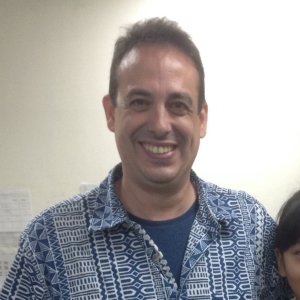
 1
1













